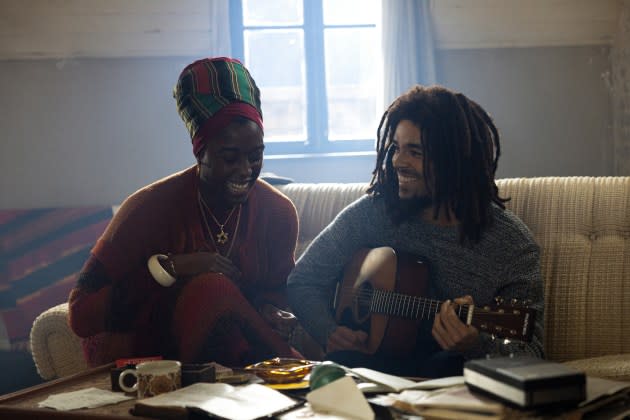‘Bob Marley: One Love’ Gives Us a Reggae Icon Minus the Rebel Soul

In 1976, Bob Marley was the most famous person in Jamaica. He was also a marked man. The star had agreed to play a free concert dubbed “Smile Jamaica.” He’d even written a theme song for the event. Though the show was conceived as a way to quell the rising tide of violence over the island nation’s precarious political state, Marley’s involvement made many think that it was his way of tacitly endorsing the People’s National Party over the more conservative Jamaica Labour Party. Two days before the concert, armed men burst into the studio where he and his band, The Wailers, were recording and opened fire. Several people were wounded, including Bob and his wife Rita Marley. Both of them would play Smile Jamaica regardless, with Rita checking herself out of the hospital so she could sing backup.
After that, she went to Delaware with their kids to stay with her mother-in-law, and Bob flew to London. He needed to be out of the line of fire. And with his band and producer Chris Blackwell in town as well, the musical legend was about to start a new phase of his career that would change everything.
More from Rolling Stone
This is where Bob Marley: One Love kicks off, rushing through the assassination attempt and the concert — we do get to see Bob (played by Kingsley Ben-Adir, who clearly put in the work) and the band tear into the opening number, “War” — before quickly dropping our man in the U.K. so he can see The Clash play a small club, meet Junior Marvin, record Exodus, and change the world, in that order. Covering roughly two years bookended by two significant concerts — Smile Jamaica in ’76 and the One Love Peace show in 1978, a hometown victory lap where Marley brought the PNP leader Michael Manley and his JLP counterpart Edward Seaga onstage as a gesture of healing — this biopic zeroes in on a concentrated period in lieu of the ol’ comprehensive cradle-to-grave format. It’s a smart move, given how everything from global superstardom to an ultimately fatal soccer injury transpired in that brief flash of time. You get Bob the father, Bob the husband, Bob the artist, Bob the spiritualist, Bob the doubter (even a prophet has shaken-faith moments), and ultimately, Bob the icon.
What you somehow don’t get in One Love is Bob the Soul Rebel, the man who sometimes seemed like he was a one-man revolution already in progress — a righteous flame that felt like it could barely be contained in human form. It’s not for lack of trying, of course, especially on Ben-Adir’s part; the British actor seems to be giving his all, bouncing and shaking like Bob in the performance sequences and lending a slightly bemused or somber air during the high times, the higher times, and the low points. This is a performer who not only took on Malcolm X in Regina King’s stellar One Night in Miami… (2020) and managed to stave off comparisons from what many feel is a landmark interpretation from another star, but gave us glimpses into who this public figure was in private.
Except there’s a weird distance that’s taking place with his Marley and the rest of the film even at its most energetic, as if this was a biopic that happened to feature the reggae musician as opposed to a movie centered around Bob circa ’78. When One Love dips into flashback interludes touching on Marley’s childhood, his confusion over his M.I.A. father (a white member of the Royal Marines who wanted little to do with his son), his courtship of wife Rita Marley, his introduction to Rastafarianism and, in the film’s best scene, recording “Simmer Down” with the original lineup of The Wailers, you do miss Ben-Adir’s presence. Yet when it cuts back to the present-day, all band-bonding and European-tour montages, not even the actor’s game attempts at channeling the late idol to millions make you feel like the film is catching a fire. Compared to Lashana Lynch’s portrayal of Rita Marley, which feels like it’s going to burn a hole through the screen, something feels absent. (After this film, her superb supporting work in 2022’s The Woman King and her scorching turn in 2021’s Ear for Eye, can we please start recognizing that Lynch is both criminally underused and one of the greatest actors of her generation? Please?!)
Maybe it can be chalked up to the fact the Marley family, who played a big part in making this film happen, were so intent on finally getting Bob’s life and message up on screen that they inadvertently missed a few vital elements. You can nitpick certain other decisions in the storytelling as well. (Why set up the two concerts as bookends and then just relegate the One Love Peace moment of triumph to an end-credit newsreel glimpse rather than recreating it?) More likely, the main culprit is the format. Bob Marley: One Love keeps bumping its head against the ceiling of the genre, sticking to a music biopic formula even as it gently tweaks it. Director Reinaldo Marcus Green (King Richard) does his duty by delivering eureka moments, a few greatest-hits sequences, some personal drama. The result is a perfectly functional look at a legend, one that will definitely make you want to put Exodus back into heavy playlist rotation. It’s still not enough.
Best of Rolling Stone
Solve the daily Crossword

